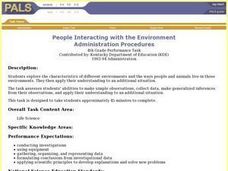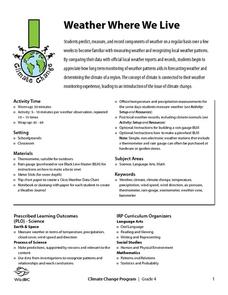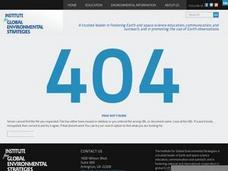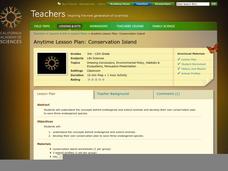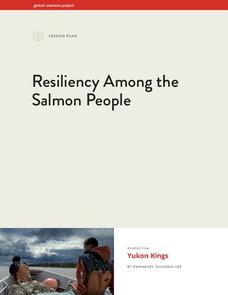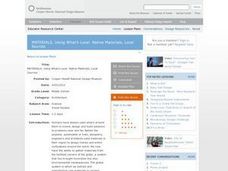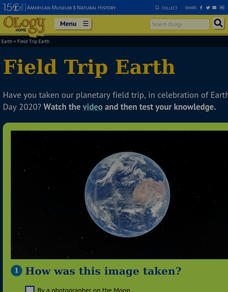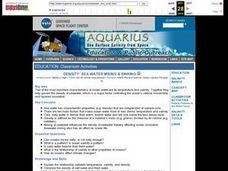PricewaterhouseCoopers
Conservation: Water
Here is a fantastic experiment-based lesson on water conservation, waste, and filtration. The lesson plan is well-developed and provides background information, discussion leads, and six scripted lab activities anyone can do. The class...
PricewaterhouseCoopers
Waste and Recycling: Recycling Paper
We take paper for granted, while thousands of trees are being made into the paper we toss in the trash. Start a dialogue about paper reduction and recycling in class, and share the negative effects paper production has on our ecosystem....
PricewaterhouseCoopers
Waste and Recycling: Recycling and Energy Recovery
Reduce, reuse, recycle, and recover. Young environmentalists learn about the overwhelming amount of garbage produced and discover better ways to minimize their impact on Earth by learning the difference between garbage and recyclables.
Curated OER
Using Solar Energy
Students experiment to determine the effect of solar energy on the temperature of water. In this renewable resources instructional activity, students measure the temperature of water in a flask that is exposed to sunlight. They relate...
Curated OER
People Interacting with the Environment
Learners explore an arctic, temperate, and tropical environment and then decide what people need in each environment to help them live comfortably and what their lives would be like.
Wild BC
Weather Where We Live
Over a span of two weeks or more, mini meteorologists record weather-related measurements. What makes this particular resource different from others covering similar activities are the thorough details for the teacher and printables for...
National Wildlife Federation
Hot, Hotter, Hottest: Extreme Weather's Impact on Our Resources
How dry is it? It's so dry, the river only runs twice a week! Through an analysis of maps and discussions, pairs learn about droughts across the United States in the ninth of 12 lessons. They then read about, answer questions, analyze...
National Park Service
Glaciers and Water
Explore the amazing power of glaciers with a hands-on earth science experiment! After first learning basic background information, learners go on to create their very own chunks of frozen water and gravel in order to observe first-hand...
Science Friday
Capturing Carbon Dioxide
Why don't we just capture carbon dioxide in the air and store it somewhere else? A hands-on lesson allows scholars to explore a complex concept. First, they will create a carbonated beverage, and then they will determine if liquid...
Pulitzer Center
The Global Water Crisis
High schoolers examine the "quiet crisis," the lack of clean water, by reading articles and viewing video clips. They discuss the situations in Ethiopia, Yemen, Kenya, and Nepal. There are two options for the lesson, but one of them...
Serendip
Food, the Carbon Cycle and Global Warming
As the world population increases, demands on the carbon cycle also increase. A well-designed lesson first explores the greenhouse effect and its impact on global warming. Further sections have pupils study the effect of greenhouse gases...
Florida International University
Design Your Own
Apply scientific principles to designing an experiment to study organisms living on the coral reef in our oceans. Through reading, individuals learn about the coral reef ecosystem and important factors that affect its function. Using the...
Curated OER
CO2 and You
Students study the scientific evidence about carbon dioxide emissions. They learn to calculate the amount of energy used by different appliances. They complete a worksheet which analyzes the amount of energy that their home uses.
California Academy of Science
Conservation Island
Why not walk in the footsteps of Teddy Roosevelt and become a conservationist? After discussing issues and reasons for animal extinction, the class creates their own conservation plans. Each small group is given mock data regarding a...
National Wildlife Federation
The Amazing Adventures of Carbon: How Carbon Cycles through the Earth
Here's a stat for your pupils: 18 percent of the human body is carbon! Part 10 in the series of 12 takes pairs on an adventure through the carbon cycle. After a class reading about carbon, pairs read and choose their own adventure...
Global Oneness Project
Reclaiming Rivers
Robert Hass's article "Rivers and Stories" underscores the importance of rivers in the development of civilization and the importance of reclaiming supposedly dead rivers and implementing policies that protect river health. Groups...
Virginia Department of Education
Evidence of Evolution
What an impression fossils make! In this activity, aspiring paleontologists view fossils and construct a timeline to further understand how the lack of natural adaptation caused historical organisms to become extinct. While they should...
Global Oneness Project
Resiliency Among the Salmon People
Is losing cultural traditions the cost of social progress, or should people make stronger efforts to preserve these traditions? High schoolers watch a short film about the native Yup'ik people in Alaska and how they handle the shifts in...
Curated OER
MATERIALS, Using What’s Local: Native Materials, Local Sources
Students consider the development of different societies. In this environmental building lesson, students consider local resources and how societies choose to use them. Students use their findings to design a 'green' building for use in...
Rainforest Alliance
Investments in Forest Carbon
One hundred metric tons of CO2 can accumulate in one acre of forest over time—that's a lot of carbon! In the activity, groups of middle school learners determine what makes forests important. They then solidify the concept by using a...
Maine Math & Science Alliance
Earth as a System
Ecosystem, human body system, weather system. We hear the word system a lot, but what does it really mean? In the activity, pairs or groups of learners discuss how a bicycle is a system and then analyze objects in their classroom and...
American Museum of Natural History
Field Trip Earth
Take a field trip around Earth by way of satellite images. Learners watch a video lesson that describes different images taken from orbiting satellites. They then test their visual skills in a 14-question online quiz.
Curated OER
Sea Water Mixing and Sinking
Students investigate the role of temperature and salinity in determining seawater density. They use a Temperature-Salinity Diagram to examine the effects of mixing on density.
Pulitzer Center
Extractive Industries
Here is a chance for environmental studies classes to take a critical look at crises occurring around the globe by reading articles and viewing video clips. The human activities under scrutiny are the extraction of oil, logging, and...
Other popular searches
- Global Climate Change
- Global Climate Change Arctic
- Global Climate Change Ice
- Weather and Climate Change
- Global Climate Change Asia
- Climate Change Activity
- Global Climate Change Debate
- Climate Change in Canada
- Oceans and Climate Change
- Climate Change Policies
- Climate Change Mechanisms
- Past Climate Change






